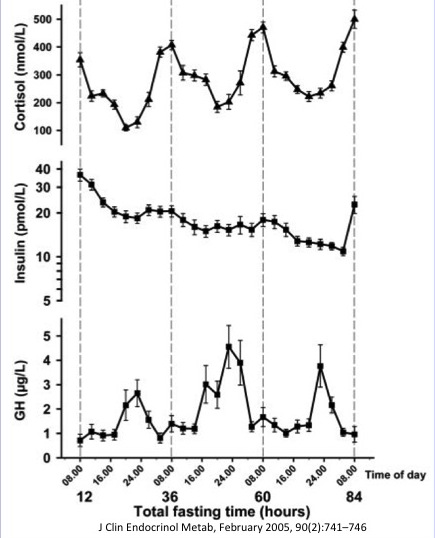Often, yes - we humans are a wacky bunch.  While I cannot rule out problems with cortisol or other hormones when doing longer fasts, at the worst I’d say “Well, we can watch out for problems, but if they don’t appear, then great. Meanwhile, we’ll likely be one of the vast and increasing number of people who have benefitted and are benefitting greatly by fasting.”
While I cannot rule out problems with cortisol or other hormones when doing longer fasts, at the worst I’d say “Well, we can watch out for problems, but if they don’t appear, then great. Meanwhile, we’ll likely be one of the vast and increasing number of people who have benefitted and are benefitting greatly by fasting.”
People get weight-loss stalls while not fasting and eating ketogenically (or not) as well. If something isn’t working right, it can be addressed. I think, however, that it’s wrong and needlessly alarmist to act like there will be problems long before that is necessarily true. The same for the unqualified statement by Drs. Phinney and Volek: “After just one day of fasting, you begin to lose body protein from lean tissue – from places like muscle, heart, liver, and kidneys. These organs and their functions are things that we want to preserve, and definitely should not be given up lightly.”
The reader: “Oh my god, if I fast I will be giving up my organs!!”
To the doctors there, I have to say, “C’mon, guys… that’s ludicrous.” This thread has quite a few people presenting facts and examples to support that.
Gotta say you’re 100% wrong, there, Bunny. I’m 58, and mostly sedentary, and was officially Type 2 Diabetic as of April this year. There are people who are older - I’ve seen them be 60, 70, even 75, and worse off metabolically, and some have lost over 200 lbs. of fat.
If we are generalizing, then I’d say the more fat one has, the easier it is to start losing it, all other things being equal.
Perhaps most don’t understand that. But so what? Again - if it’s not a problem, then it does not matter. From what I have seen, it is only a very small percentage of people who do longer fasts and don’t lose (enough) weight or have hormonal problems stemming from the fast. Vastly more people do lose weight and do improve their hormonal situation - witness the improvement in insulin resistance and blood sugar control.
I just don’t think that’s true - that EF causes that fat buildup. I think you’re attributing it to the cortisol effect, and that is at issue.






 While I cannot rule out problems with cortisol or other hormones when doing longer fasts, at the worst I’d say “Well, we can watch out for problems, but if they don’t appear, then great. Meanwhile, we’ll likely be one of the vast and increasing number of people who have benefitted and are benefitting greatly by fasting.”
While I cannot rule out problems with cortisol or other hormones when doing longer fasts, at the worst I’d say “Well, we can watch out for problems, but if they don’t appear, then great. Meanwhile, we’ll likely be one of the vast and increasing number of people who have benefitted and are benefitting greatly by fasting.”